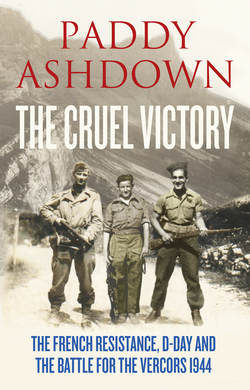Читать книгу The Cruel Victory: The French Resistance, D-Day and the Battle for the Vercors 1944 - Paddy Ashdown, Paddy Ashdown - Страница 11
PROLOGUE
ОглавлениеAbove the city of Grenoble, at Saint-Nizier-du-Moucherotte, the sun rose into a perfect sky at 04.48 on the morning of 13 June 1944. For the 700 young men who had spent the previous night under the summer stars, strung out along a 3-kilometre defensive line on the Charvet ridge, it bought a welcome warmth against the damp early-morning chill. Bees hummed among the flowers and grasses and everywhere little birds darted from clump to bush, seeking out insects. High above the early lark let down her string of liquid notes. Below them, the Grésivaudan valley, bounded by the Chartreuse massif on one side and the Bauges and Oisans ranges on the other, glowed with the colours of high summer. And in the distance, like a great white whale, the snow-covered hump-back of Mont Blanc sparkled in the sunlight. In normal times this would have been good day for lovers – and country walks – and family picnics. But this was not a normal time – and this would not be a normal day.
Modern-day soldiers almost always fight and die miles from home. But these young men – many little more than boys – looked down that morning to see their home city laid out as plain as a street map. They knew its every nook and cranny. There was the park where they had played football with friends. There the school they had attended. There the square in which they had hung around, watching the girls go by. There the café where they had met a lover. And there the rented flat where wives and children still slept this summer morning, as they lay out in the dew-soaked grass, waiting for the enemy to come.
Whatever politicians say, soldiers do not die for their country. They die, mostly, for the man next to them – the comrade they know will lay down his life for them. And for whom they, too, will lay down theirs in their turn – if required to do so. But most of these young Maquisards lying out this warm summer’s morning on the Charvet hill, in the same clothes – even the same white shirts – in which they had left home only days previously, were different. Young, naive, unpractised in the use of arms, inexperienced in the terrors of war, they had come to the plateau out of a genuine sense of patriotism mixed with romance and adventure. Their youthful enthusiasm remained undimmed by the dull, mind-numbing routines of the professional soldier. How were they to know that their proudly acquired Sten guns would be little more than pop-guns against the steel-clad might and majesty of the world’s finest army, now massing invisibly below them? How were they to know, plucked so suddenly out of comfortable city lives, what it would be like to watch a friend cough out his life’s blood on the grass next to them? These things were literally beyond their imaginings.
And so, in ways unknown to the common soldier, they lay there, waiting for their enemy – apprehensively of course – but in their innocence also proudly, bravely, determinedly, ready to carry out what they believed was a glorious duty on behalf of their long-oppressed country. ‘It’s the morning of Austerlitz!’ declared one, referring to Napoleon’s great victory over the Austrians in 1805.
Suddenly, there was a new noise punctuating the early-morning hum of the city, drifting up to them on a light summer breeze. It was the insistent thump of a German heavy machine gun somewhere in the woods and meadows below them. Little flowers of dirt started sprouting among them in the long grass where they lay. Looking to the foot of the hill, they could make out tiny dots of field grey spreading out as they started to move slowly up towards them.
‘They’re coming!’ someone shouted.
